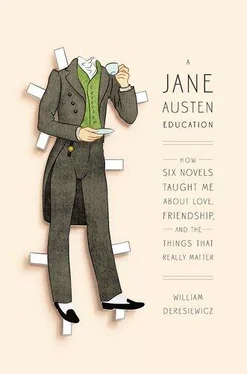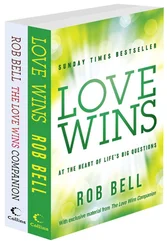I also loved the fact that Elizabeth had as little interest in getting married as I did (and with parents like hers, who could blame her?). “If I were determined to get a rich husband,” she remarked at one point, “or any husband . . .” Of course, that didn’t stop her mother from having her own ideas. As the curtain opened, Mrs. Bennet, whose every waking thought was devoted to getting her daughters married, was nagging her husband to introduce himself to Charles Bingley, a wealthy young man who had just moved in to the neighborhood, before the other mothers could get their hands on him.
Soon the sisters had met both him and his even wealthier friend, Mr. Darcy. The two couldn’t have been more different. Bingley was as cheerful and eager as a beagle. “Upon my honour,” he told his friend at the first ball, “I never met with so many pleasant girls in my life as I have this evening.” But Darcy was as haughty as a Siamese cat, practically licking himself clean whenever someone touched him the wrong way. He even had the gall to snub Elizabeth before he had so much as met her. “She is tolerable,” Darcy protested when his friend suggested that he ask her to dance, “but not handsome enough to tempt me ”—a statement I took as a personal affront. What kind of idiot would not find Elizabeth Bennet every bit as adorable as I did? The heroine agreed. While her sister and Bingley fell quickly in love (he was the “just what a young man ought to be” whom Jane was gushing about), she wrote Darcy down as an insufferable prig. Soon a third young man arrived who, having known Darcy as a child, confirmed all of her suspicions about his character.
Darcy, meanwhile, viewed Bingley’s courtship with alarm, and he was not one to keep his opinions to himself. Not only was Jane beneath his friend in social terms, but other than herself and Elizabeth, their entire family was unspeakably vulgar. A dance at Bingley’s sealed Jane’s fate. Everyone was there, providing the Bennets with the maximum opportunity to make a spectacle of themselves. Mrs. Bennet crowed loudly about the impending match—“It was, moreover, such a promising thing for her younger daughters, as Jane’s marrying so greatly must throw them in the way of other rich men”—oblivious to the way she was coming across and the fact that the wrong people might be listening. “What is Mr. Darcy to me,” she snorted, when Elizabeth tried to quiet her down, “that I should be afraid of him?” Mary, with more affectation than talent, tried to show off, badly, on the piano. And as for the Bennets’ clergyman cousin, Mr. Collins, one of the greatest fools in literary history, pompous and obsequious at the same time (“I consider the clerical office as equal in point of dignity with the highest rank in the kingdom—provided that a proper humility of behaviour is at the same time maintained”), he committed the unpardonable faux pas of addressing himself to Mr. Darcy without a formal introduction.
Elizabeth cringed at every turn—if “her family made an agreement to expose themselves as much as they could during the evening, it would have been impossible for them to play their parts with more spirit or finer success”—and I suffered along with her. Her family was blowing it for Jane, the only one of them, other than Elizabeth herself, who was worth a damn. But it was too late; Darcy had seen enough. He didn’t care, it seemed, that his friend and Jane were in love. The next thing the Bennets knew, the young men were gone, and it looked like they’d never see Bingley again. Jane was crushed. Elizabeth was furious. I wanted to wring Darcy’s neck.
This was a completely different experience than reading Emma, and not just because I’d already become a convert. Emma showed me from the very beginning just how desperately wrong its heroine was. I couldn’t stand her—until Austen showed me how much I resembled her. But here I was, halfway through Pride and Prejudice, and not only was I head over heels for Elizabeth, I agreed with everything she said and every judgment she made. I loved her friends and hated her enemies. I would have taken her side against the world.
But then, as if a switch had been flipped, everything got turned upside down. Elizabeth ran into someone she never expected to see again. He made a declaration she never expected to hear. She lashed out in a fit of resentment. He responded with a long, coolly argued letter that threw all the events of the first half of the novel into a completely different light. She read it once and rejected its claims. She read it again—and suddenly saw she’d been utterly wrong all along.
Because Jane’s love for Bingley was so clear to her, Elizabeth now realized, she’d assumed that it was clear to everyone else. Because her sister was so wonderful, she’d refused to believe, when push came to shove, that their family’s behavior would prevent Jane from marrying well. Because Elizabeth was so proud herself, she’d disdained the pride of others when she found it aimed in her direction. But worst of all, she now saw, was her judgment of character—the very thing on which she most congratulated herself. She had thought that she could read a man the very first time she met him. She had made the mistake of believing that if a young man was affable and friendly, he must be good, and that if he was cold and arrogant and reserved, he must be bad.
But now she saw how completely mistaken she’d been. Her verdict, delivered with all her characteristic bluntness and courage, was uncompromising: “blind, partial, prejudiced, absurd.” “How despicably I have acted!” she exclaimed to herself. “I, who have prided myself on my discernment! I, who have valued myself on my abilities!”
But of course, if Elizabeth had been wrong about everything, then so had I. I had made the very same judgments that she had, and I had made them every bit as badly. This was indeed a different experience from reading Emma . That novel had invited me to laugh at its heroine, with all her ridiculous schemes. But this time, the joke was on me.
So enthralled had I been by Elizabeth’s intelligence and charm that I had never once thought to question her. No doubt self-flattery had played a big role there. Austen had seduced me into identifying with her heroine, and I had been only too happy to comply. Now it turned out that if I did indeed resemble her, it was not for the reasons I’d supposed. Elizabeth trusted her judgment way too much—just as I did. She was so much cleverer than everyone she knew except her father—who was always telling her how clever she was—that she imagined that everything she believed must be true, just because she believed it. She didn’t think she needed to give other people a fair hearing. What could they possibly have to say? She already knew everything she needed to know.
The novel’s original title had been First Impressions. Elizabeth was not prejudiced in the modern sense of the word. She didn’t judge people before she met them, because of the group they belonged to. She judged them the moment she met them, because she thought she could already tell everything about them. “First impressions”: it seemed to me now that the phrase did double duty. It referred to the heroine’s tendency to jump to conclusions, and it also pointed to ours, as we put ourselves in her place.
There was a third meaning, too. “First” as in “early”—as in, the things that happen to you when you’re first starting out in life. The novel, I saw, wasn’t finally about prejudice, or pride, or even love. Elizabeth was all of twenty, and her mistakes were errors of youth—the mistakes, precisely, of a person who has never made mistakes, or at least, who has never been forced to acknowledge them. Beneath the polished wit that she flashed at the world like a suit of armor, Elizabeth was still scarcely more than a girl. “If I were determined to get a rich husband, or any husband”: that was the statement, not of someone who knew what she wanted from life, but of someone who hadn’t even started to figure it out. When she had her epiphany—“blind, partial, prejudiced, absurd”—she added a final count to her indictment: “Till this moment I never knew myself.” Darcy’s pride and Elizabeth’s prejudice, his prejudice and her pride: these may have set the plot in motion, but by putting me through Elizabeth’s experiences—by having her make mistakes and learn from them, and having me stumble and learn right there along with her—what the novel was really showing me was how to grow up.
Читать дальше












